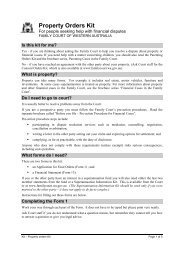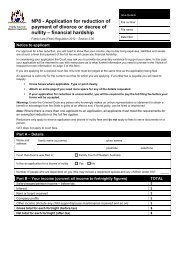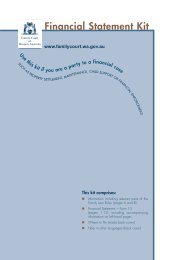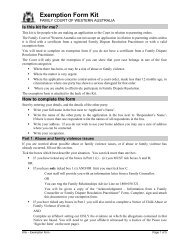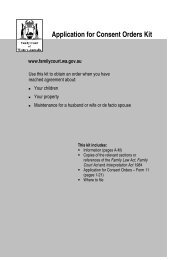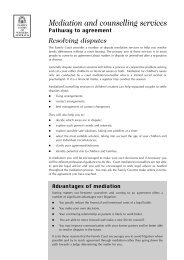[2005]fcwa 96 jurisdiction - Family Court of Western Australia
[2005]fcwa 96 jurisdiction - Family Court of Western Australia
[2005]fcwa 96 jurisdiction - Family Court of Western Australia
Create successful ePaper yourself
Turn your PDF publications into a flip-book with our unique Google optimized e-Paper software.
[<strong>2005</strong>]FCWA <strong>96</strong><br />
JURISDICTION:<br />
FAMILY COURT OF WESTERN AUSTRALIA<br />
ACT: FAMILY LAW ACT 1975<br />
LOCATION:<br />
PERTH<br />
CITATION:<br />
THE COMMONWEALTH OF AUSTRALIA and<br />
[G] [<strong>2005</strong>] FCWA <strong>96</strong><br />
CORAM:<br />
PENNY J<br />
HEARD: 2 SEPTEMBER <strong>2005</strong><br />
DELIVERED: 9 SEPTEMBER <strong>2005</strong><br />
FILE NO/S: PT 63 <strong>of</strong> 2004<br />
BETWEEN:<br />
DEPUTY COMMISSIONER OF TAXATION<br />
FOR THE COMMONWEALTH OF<br />
AUSTRALIA<br />
Applicant<br />
AND<br />
[G]<br />
Respondent
Catchwords:<br />
Contravention - no reasonable excuse - no lack <strong>of</strong> certainty <strong>of</strong> the orders<br />
Legislation:<br />
<strong>Family</strong> Law Act 1975 - s 112AB, s 112AD, s 112 AC<br />
Evidence Act 1995 - s 140<br />
Category: Not Reportable<br />
Representation:<br />
Counsel:<br />
Applicant:<br />
Respondent:<br />
Ms G Archer<br />
Mr F Castiglione QC<br />
Solicitors:<br />
Applicant:<br />
Respondent:<br />
<strong>Australia</strong>n Government Solicitor<br />
A R Clarke & Assoc<br />
Case(s) referred to in judgment(s):<br />
Fauna Holdings Pty Ltd v Mitchell (2000) FLC 93-503<br />
Lindsay and Lindsay (1995) FLC 92-638<br />
Reilly and Reilly (1995) FLC 92-616<br />
1 In this matter the applicant Deputy Commission <strong>of</strong> Taxation<br />
alleges the respondent husband has contravened an order <strong>of</strong> this<br />
<strong>Court</strong> made on 17 June <strong>2005</strong> and amended on 30 June <strong>2005</strong>, by
transferring $95,980 on 30 June <strong>2005</strong> from an account secured over<br />
the property [in the northern suburbs], to his superannuation fund.<br />
The husband has pleaded not guilty to this allegation.<br />
2 Part XIIIA <strong>of</strong> the <strong>Family</strong> Law Act 1975 deals with sanction for<br />
failure to comply with orders. The term "contravene an order" is<br />
defined by s 112AB(1) <strong>of</strong> the Act.<br />
"112AB Meaning <strong>of</strong> contravene an order<br />
(1) A person shall be taken for the purposes <strong>of</strong> this Part to<br />
have contravened an order under this Act if, and only if:<br />
(a) where the person is bound by the order - he or she has:<br />
(i) intentionally failed to comply with the order; or<br />
(ii) made no reasonable attempt to comply with the<br />
order; or<br />
(b) in any other case - he or she has:<br />
(i) intentionally prevented compliance with the order<br />
by a person who is bound by it; or<br />
(ii) aided or abetted a contravention <strong>of</strong> the order by a<br />
person who is bound by it."<br />
3 S 112 AD <strong>of</strong> the Act provides for sanctions to be imposed if<br />
an order is contravened.<br />
"112AD Sanctions for failure to comply with orders<br />
(1) If a court having <strong>jurisdiction</strong> under this Act is satisfied that<br />
a person has, without reasonable excuse, contravened an<br />
order under this Act, the court may make an order for the<br />
imposing, in respect <strong>of</strong> the person, <strong>of</strong> one or more <strong>of</strong> the<br />
sanctions available to be imposed under subsection (2),<br />
being a sanction or sanctions that the court considers to be<br />
the most appropriate in the circumstances."<br />
4 The applicant submitted that the standard <strong>of</strong> pro<strong>of</strong> to be<br />
applied in these proceedings is that applying to civil proceedings as<br />
set out in s 140 <strong>of</strong> the Commonwealth Evidence Act 1995. S 140<br />
states as follows:<br />
"140 Civil proceedings: standard <strong>of</strong> pro<strong>of</strong><br />
(1) In a civil proceeding, the court must find the case <strong>of</strong> a<br />
party proved if it is satisfied that the case has been<br />
proved on the balance <strong>of</strong> probabilities.
(2) Without limiting the matters that the court may take<br />
into account in deciding whether it is so satisfied, it is<br />
to take into account:<br />
(a) the nature <strong>of</strong> the cause <strong>of</strong> action or defence; and<br />
(b) the nature <strong>of</strong> the subject-matter <strong>of</strong> the<br />
proceeding; and<br />
(c) the gravity <strong>of</strong> the matters alleged."<br />
5 The <strong>Family</strong> <strong>Court</strong> <strong>of</strong> <strong>Western</strong> <strong>Australia</strong> is a State <strong>Court</strong> and<br />
the Commonwealth Evidence Act has little application in this<br />
<strong>jurisdiction</strong> (see s 5).<br />
6 The standard <strong>of</strong> pro<strong>of</strong> to be applied in relation to s 112AD<br />
proceedings was discussed in Reilly and Reilly (1995) FLC 92-616.<br />
In that matter Halligan JR decided that the Commonwealth<br />
Evidence Act 1995 did not apply to proceedings heard in a court <strong>of</strong><br />
summary <strong>jurisdiction</strong> and the criminal standard <strong>of</strong> pro<strong>of</strong>, that is<br />
pro<strong>of</strong> beyond a reasonable doubt, applied to s 112AD proceedings.<br />
7 In Lindsay and Lindsay (1995) FLC 92-638 the Full <strong>Court</strong><br />
was asked to consider the standard or pro<strong>of</strong> applying to<br />
proceedings brought pursuant to Part XIIIA <strong>of</strong> the <strong>Family</strong> Law Act<br />
1975. They determined that s 140 <strong>of</strong> the Evidence Act applied to<br />
contravention proceedings and the standard was the civil standard,<br />
the degree <strong>of</strong> satisfaction which the civil standard required varied<br />
according to the gravity <strong>of</strong> the facts to be proved. The Full <strong>Court</strong><br />
stated, however, that find a finding relating to the civil standard<br />
applying to s 112AD may not apply to proceedings heard in a court<br />
which is not a Federal court. There is no equivalent in the <strong>Western</strong><br />
<strong>Australia</strong>n Evidence Act to s 140 <strong>of</strong> the Commonwealth Evidence<br />
Act, therefore the applicant must prove his case beyond a<br />
reasonable doubt.<br />
The facts<br />
8 Proceedings in this <strong>Court</strong> commenced between the wife and<br />
the respondent husband in January 2004. The husband, through<br />
various entities controlled by him, owed the ATO more than $1m.<br />
The Deputy Commissioner became a party to the proceedings in<br />
order to ensure that there would be sufficient funds available to the<br />
husband and his entities to meet the debt owing.<br />
9 On 17 June <strong>2005</strong> I handed down a judgment in relation to the<br />
issue <strong>of</strong> spousal maintenance and adult child maintenance. I was<br />
then asked, on behalf <strong>of</strong> the husband, to make an order, which had
previously been sought by him, restraining the wife from selling<br />
chattels and art work in her possession. After some encouragement<br />
from the counsel for the Deputy Commissioner, I made the<br />
following order:<br />
"4 Until further order <strong>of</strong> the <strong>Court</strong>, both parties be restrained<br />
and an injunction is hereby granted restraining each <strong>of</strong><br />
them from selling, encumbering or in any way dealing<br />
with any property or assets in their possession or<br />
control."<br />
10 At the hearing on 30 June <strong>2005</strong> I was asked by counsel for the<br />
wife to vary the injunction so that it only covered art work or home<br />
contents. Counsel for the applicant objected, stating that the<br />
Deputy Commissioner wanted to know what assets were being<br />
disposed <strong>of</strong> so that they could ensure their debt was paid. After<br />
hearing from counsel for the wife and for the Deputy<br />
Commissioner I varied the order made on 17 June <strong>2005</strong> as follows:<br />
"1 Paragraph 4 <strong>of</strong> the orders made 17 June <strong>2005</strong> be<br />
amended to read:<br />
"Until further order <strong>of</strong> the <strong>Court</strong>, both parties be<br />
restrained and an injunction is hereby granted restraining<br />
each <strong>of</strong> them from selling, encumbering or in any way<br />
dealing with any art work, chattels or real estate in their<br />
control."<br />
11 The hearing on 30 June <strong>2005</strong> commenced at 9.13 am and the<br />
variation to order 4 appears to have been made no longer than 10<br />
minutes after the commencement <strong>of</strong> the proceedings.<br />
12 At 11.46 am on 30 June <strong>2005</strong> the husband drew down from a<br />
mortgage account secured over his property [in the northern<br />
suburbs], the sum <strong>of</strong> $95,980 and made a contribution to his<br />
superannuation fund in that sum. By doing so the respondent<br />
husband increased the encumbrance against the [northern suburbs]<br />
property. The applicant says he breached the order <strong>of</strong> 17 June <strong>2005</strong><br />
as amended on 30 June <strong>2005</strong> by encumbering or dealing with the<br />
property.<br />
13 The respondent denies that he has contravened the order but<br />
says if he has, he has a reasonable excuse.
Has the husband contravened the order?<br />
14 The husband's position at trial was that he could not<br />
contravene the order because the terms <strong>of</strong> it were, as far as he was<br />
concerned, uncertain.<br />
15 The husband gave evidence that at the time <strong>of</strong> the court<br />
hearing on 17 June <strong>2005</strong> he was out <strong>of</strong> Perth hiking [in the<br />
northwest]. He was out <strong>of</strong> telephone contact and did not know the<br />
outcome <strong>of</strong> the court proceedings when he returned on 20 June<br />
<strong>2005</strong>. On 24 June <strong>2005</strong> he had a meeting with his solicitor, Mr<br />
Thomas Kuurstra. He initially stated in his evidence that he had no<br />
recollection <strong>of</strong> being told at the meeting that an injunction had been<br />
made while he was away. He said that at that meeting he had<br />
mentioned to Mr Kuurstra, his lawyer, that his accountant had<br />
recommended he pay superannuation before 30 June <strong>2005</strong>, and if<br />
he did he would save approximately $45,000 in tax. The husband<br />
said Mr Kuurstra told him not to do anything in relation to the<br />
payment <strong>of</strong> superannuation without consulting him.<br />
16 He then stated Mr Kuurstra told him at the meeting on 24 June<br />
<strong>2005</strong> that the injunction made on 17 June <strong>2005</strong>, was so wide that it<br />
would stop him even buying a sandwich.<br />
17 The husband's previous evidence had been that he had not<br />
known an injunction had been made when he met with Mr Kuurstra<br />
on 24 June <strong>2005</strong>. The husband's evidence was contradictory.<br />
18 On 30 June <strong>2005</strong>, the husband got a phone call from his<br />
accountant, [Mr C] telling him that he needed to pay the<br />
superannuation on that day to be able to obtain the tax advantage.<br />
The husband knew Mr Kuurstra was going to court on his behalf<br />
that morning, and that he was attempting to narrow the terms <strong>of</strong> the<br />
injunction. He stated he thought the terms <strong>of</strong> the injunction after<br />
30 June <strong>2005</strong> would be "far less invasive", although he had no idea<br />
what the terms would be.<br />
19 The husband gave evidence that on the morning <strong>of</strong> 30 June<br />
<strong>2005</strong> he attempted to contact Mr Kuurstra about mid-morning, but<br />
was not able to speak to him. He made a decision at 11.46 am on<br />
that day to transfer from the mortgage account at the National<br />
<strong>Australia</strong> Bank to his superannuation account, the exact amount as<br />
recommended by his accountant, which was $95,980. This transfer<br />
was effected over the internet. He stated at the time he effected the<br />
transfer he had no knowledge <strong>of</strong> the terms <strong>of</strong> the injunction made
that morning. He spoke to his lawyer later in the afternoon and<br />
was told the terms <strong>of</strong> the injunction had not been narrowed as much<br />
as Mr Kuurstra thought they would be. He then told Mr Kuurstra<br />
he had transferred the funds.<br />
20 When cross-examined by Ms Archer, counsel for the Deputy<br />
Commissioner, the husband stated that at the meeting on 24 June<br />
<strong>2005</strong> Mr Kuurstra had told him when he asked about making the<br />
superannuation payment, not to do anything as the orders made on<br />
17 June <strong>2005</strong> were very restrictive. The husband confirmed that he<br />
thought the injunction made on 17 June <strong>2005</strong> was so broad that he<br />
could not buy a sandwich without breaching it. He was aware that<br />
the transaction transferring the funds from the mortgage account to<br />
the superannuation account would be a breach <strong>of</strong> the order made on<br />
17 June, but he thought that the order would be varied on the<br />
morning <strong>of</strong> 30 June <strong>2005</strong>.<br />
21 The husband conceded in cross-examination there was no<br />
guarantee that the order made on 17 June would be set aside. He<br />
acknowledged there was a possibility that the order would not be<br />
varied.<br />
22 The husband also conceded he knew the order as it existed on<br />
17 June <strong>2005</strong> restricted his access to his property and that he could<br />
not use the former matrimonial home [in the northern suburbs] to<br />
borrow more money.<br />
23 The husband's legal adviser, Mr Thomas Kuurstra, gave<br />
evidence. He stated that when the injunction was made on 17 June<br />
<strong>2005</strong> he had been unaware, although he was in court, <strong>of</strong> the breadth<br />
<strong>of</strong> that injunction. He confirmed that after the husband returned<br />
from Kununurra he had an appointment with him on Friday 24<br />
June <strong>2005</strong>. At that meeting the husband stated that he wanted to<br />
make a superannuation payment that year. Mr Kuurstra told him<br />
that he should talk to him before he did it. He said he did not<br />
advise him about the injunction or the breadth <strong>of</strong> it at that time<br />
because he thought the injunction only restricted the husband<br />
dealing with chattels and art work. He said there was definitely no<br />
mention <strong>of</strong> the injunction at that meeting as he had not obtained the<br />
orders from the court by that time.<br />
24 Around 28 or 29 June <strong>2005</strong>, Mr Kuurstra received a copy <strong>of</strong><br />
the orders made on 17 June and realised that the injunction was in<br />
very different terms to that which he had assumed had been made.<br />
He spoke to the husband on the telephone and advised him <strong>of</strong> the
terms <strong>of</strong> the injunction. He told him he intended to go back to<br />
court on 30 June and attempt to narrow the scope <strong>of</strong> it.<br />
25 On 29 June <strong>2005</strong> Mr Kuurstra wrote to Mr Carr, the wife's<br />
solicitor, advising him <strong>of</strong> the restrictive nature <strong>of</strong> the injunction.<br />
Mr Carr agreed the orders needed to be changed and when they<br />
attended court on 30 June <strong>2005</strong> he would consent to an amendment<br />
<strong>of</strong> the orders to cover only art work and chattels. Mr Kuurstra<br />
stated that he did not tell the husband Mr Carr had agreed to a<br />
change in the terms <strong>of</strong> the injunction.<br />
26 Mr Kuurstra appeared in court on 30 June on behalf <strong>of</strong> the<br />
husband. After returning from court he dictated a letter to the<br />
husband telling him what had happened on that day. He spoke to<br />
the husband about 3.00 pm. At that time the husband stated that he<br />
had decided he wanted a September trial. He also told him that he<br />
had increased the mortgage to make a superannuation payment. Mr<br />
Kuurstra told him <strong>of</strong> the order which had been made on 30 June,<br />
and told him he was not sure whether he had breached it or not.<br />
27 On 18 July <strong>2005</strong> Mr Kuurstra sent Mr Carr a letter advising <strong>of</strong><br />
the transfer <strong>of</strong> the funds from the mortgage account to the<br />
superannuation account. That letter had been given to the husband,<br />
in draft, to approve its contents before it was sent.<br />
28 The final paragraph <strong>of</strong> that letter states as follows:<br />
"For that reason it was [Mr G’s] view that accessing those<br />
funds was in the nature <strong>of</strong> accessing savings, and did not<br />
contravene the injunction granted by Justice Penny on 30 June<br />
<strong>2005</strong>."<br />
29 Mr Kuurstra gave evidence that while this paragraph indicated<br />
that the husband knew the terms <strong>of</strong> the injunction when he<br />
transferred the funds, that was not the case. Mr Kuurstra did not<br />
inform him <strong>of</strong> the terms <strong>of</strong> the injunction until later in the afternoon<br />
<strong>of</strong> 30 June. Mr Kuurstra's evidence was that the only telephone<br />
message he received from the husband on 30 June <strong>2005</strong> was a<br />
message left with his receptionist at 12.52 pm on 30 June <strong>2005</strong>,<br />
asking Mr Kuurstra to ring him. The transfer had been effected<br />
prior to this telephone call.<br />
30 In my opinion, the husband did not want to know the outcome<br />
<strong>of</strong> the court proceedings before he made the transfer because the<br />
terms <strong>of</strong> the injunction, varied or not, may still have restricted his<br />
ability to transfer the funds from the mortgage account.
31 I am satisfied that the husband contravened the order. The<br />
transfer from the mortgage account to the superannuation fund had<br />
the effect <strong>of</strong> breaching the order made on 17 June, as varied on 30<br />
June in that it increased the encumbrance on the real estate in the<br />
possession <strong>of</strong> the husband. I am satisfied beyond a reasonable<br />
doubt he intentionally failed to comply with the order. He knew on<br />
the 28 or 29 June there was an injunction in place restraining him<br />
from dealing with any <strong>of</strong> his property. He knew that his solicitor,<br />
on the morning <strong>of</strong> 30 June, was going to make application to<br />
restrict the breadth <strong>of</strong> that injunction. He did not know what the<br />
result would be. He did not know whether the application would<br />
be successful at all. According to his solicitor, he did not even<br />
know that the wife's solicitors would consent to the application to<br />
vary the injunction. Neither the husband nor the wife's solicitors<br />
knew what the attitude <strong>of</strong> the Deputy Commissioner would be.<br />
The husband did not attempt to find out what, if any, variation had<br />
been made to the injunction before he transferred the funds to the<br />
superannuation fund.<br />
32 The transfer <strong>of</strong> funds was not casual, accidental or<br />
unintentional. As to what "intentional" means in this context the<br />
Full <strong>Court</strong> state in Fauna Holdings Pty Ltd v Mitchell (2000) FLC<br />
93-503 at p 87,851, stated as follows:<br />
"In our view, s 112AB(1)(a)(i) says no more than a<br />
contravention <strong>of</strong> an order shall have occurred if a person<br />
intentionally does an act which amounts to a contravention <strong>of</strong><br />
the order. It is necessary to show that the act was intentional<br />
rather than casual, accidental or unintentional."<br />
Reasonable excuse<br />
33 It is not sufficient for the husband only to have contravened an<br />
order before he can be sanctioned for a failure to comply with it; I<br />
have to be satisfied that he contravened the order without<br />
reasonable excuse.<br />
34 S 112AC sets out the meaning <strong>of</strong> "reasonable excuse":<br />
"112AC Meaning <strong>of</strong> reasonable excuse for contravening an<br />
order<br />
(1) The circumstances in which a person may be taken to<br />
have had, for the purposes <strong>of</strong> this Part, a reasonable excuse<br />
for contravening an order under this Act include, but are<br />
not limited to, the circumstances set out in subsection (2).
(2) A person (in this subsection called the respondent) shall be<br />
taken to have had a reasonable excuse for contravening an<br />
order under this Act if:<br />
(a) the respondent contravened the order because, or<br />
substantially because, he or she did not, at the time <strong>of</strong><br />
the contravention, understand the obligations imposed<br />
by the order on the person who was bound by it; and<br />
(b) the court is satisfied that the respondent ought to be<br />
excused in respect <strong>of</strong> the contravention."<br />
35 The respondent raises a number <strong>of</strong> matters which he says<br />
amount to a reasonable excuse for his contravention <strong>of</strong> the order.<br />
Firstly, he says in his opinion the transfer <strong>of</strong> the money from the<br />
mortgage account to the superannuation fund did not amount to a<br />
breach as the money was going to an entity, the superannuation<br />
fund, which was ultimately for his benefit. I do not accept that this<br />
was a reasonable excuse. The husband was told by Mr Kuurstra he<br />
should not transfer money to the superannuation fund without<br />
getting approval from him as it may breach the injunction. The<br />
husband never attempted to get a definite opinion from Mr<br />
Kuurstra as to whether the injunction would be breached. He knew<br />
Mr Kuurstra was going back to court on 30 June <strong>2005</strong> to vary the<br />
injunction. He did not ask him to seek a variation to enable the<br />
superannuation payment to be made.<br />
36 Second, the husband says he has a reasonable excuse for<br />
making the transaction as the parties' assets have increased by the<br />
amount transferred to the superannuation fund and he has avoided<br />
the payment <strong>of</strong> $45,000 worth <strong>of</strong> tax. This ignores the rights <strong>of</strong> the<br />
Deputy Commissioner who, unless the transaction made by the<br />
husband is reversed, faces a reduced asset pool from which their<br />
debt can be paid.<br />
37 The husband says he had a reasonable excuse because his<br />
accountant put pressure on him on 30 June to make the payment by<br />
the end <strong>of</strong> that day and as he thought the injunction would be<br />
varied, he did not think there would be a problem making the<br />
transfer. I do not accept the husband's explanation in relation to<br />
this. He did not attempt to find out what, if anything, happened to<br />
the injunction before he transferred the money.<br />
38 The husband says because he had been making accelerated<br />
payments on the mortgage, the amount owing to the bank was<br />
significantly lower than it would be if he only made the minimum<br />
payment. Because <strong>of</strong> this, he thought he could draw down that
facility without breaching the order. This is not a reasonable<br />
excuse. The effect <strong>of</strong> the husband's actions was to increase the<br />
liabilities <strong>of</strong> the parties. He knew that the injunction <strong>of</strong> 17 June<br />
prevented this. He chose not to find out the terms <strong>of</strong> the injunction<br />
on 30 June.<br />
39 In my opinion, the husband did not have a reasonable excuse<br />
for failing to comply with the order and is guilty <strong>of</strong> the<br />
contravention.<br />
I certify that the preceding [39] paragraphs are a true copy <strong>of</strong> the reasons<br />
for<br />
judgment delivered by this Honourable <strong>Court</strong><br />
Associate
1 o<br />
ORDERS\Contravention<br />
JURISDICTION :<br />
FAMILY COURT OF WESTERN AUSTRALIA<br />
ACT : FAMILY LAW ACT 1975<br />
LOCATION<br />
: PERTH<br />
CITATION<br />
: THE COMMONWEALTH OF AUSTRALIA<br />
and GREENBERG [<strong>2005</strong>] FCWA <strong>96</strong><br />
CORAM<br />
: PENNY J<br />
HEARD : 2 SEPTEMBER <strong>2005</strong>
DELIVERED : 9 SEPTEMBER <strong>2005</strong><br />
FILE NO/S : PT 63 <strong>of</strong> 2004<br />
BETWEEN<br />
: DEPUTY COMMISSIONER OF TAXATION<br />
FOR THE COMMONWEALTH OF<br />
AUSTRALIA<br />
Applicant<br />
AND<br />
HARRIS CHARLES GREENBERG<br />
Respondent<br />
Catchwords:<br />
Contravention - no reasonable excuse - no lack <strong>of</strong> certainty <strong>of</strong> the orders<br />
Legislation:<br />
<strong>Family</strong> Law Act 1975 - s 112AB, s 112AD, s 112 AC<br />
Evidence Act 1995 - s 140<br />
Category: Not Reportable<br />
Representation:<br />
Counsel:<br />
Applicant : Ms G Archer<br />
Respondent : Mr F Castiglione QC<br />
Solicitors:<br />
Applicant : <strong>Australia</strong>n Government Solicitor
Respondent : A R Clarke & Assoc<br />
Case(s) referred to in judgment(s):<br />
Fauna Holdings Pty Ltd v Mitchell (2000) FLC 93-503<br />
Lindsay and Lindsay (1995) FLC 92-638<br />
Reilly and Reilly (1995) FLC 92-616<br />
1 In this matter the applicant Deputy Commission <strong>of</strong> Taxation<br />
alleges the respondent husband has contravened an order <strong>of</strong> this<br />
<strong>Court</strong> made on 17 June <strong>2005</strong> and amended on 30 June <strong>2005</strong>, by<br />
transferring $95,980 on 30 June <strong>2005</strong> from an account secured over<br />
the property at Sycamore Rise, Dianella, to his superannuation<br />
fund. The husband has pleaded not guilty to this allegation.<br />
2 Part XIIIA <strong>of</strong> the <strong>Family</strong> Law Act 1975 deals with sanction for<br />
failure to comply with orders. The term "contravene an order" is<br />
defined by s 112AB(1) <strong>of</strong> the Act.<br />
"112AB Meaning <strong>of</strong> contravene an order<br />
(1) A person shall be taken for the purposes <strong>of</strong> this Part to<br />
have contravened an order under this Act if, and only if:<br />
(a) where the person is bound by the order - he or she has:<br />
(i) intentionally failed to comply with the order; or<br />
(ii) made no reasonable attempt to comply with the<br />
order; or<br />
(b) in any other case - he or she has:<br />
(i) intentionally prevented compliance with the order<br />
by a person who is bound by it; or<br />
(ii) aided or abetted a contravention <strong>of</strong> the order by a<br />
person who is bound by it."
3 S 112 AD <strong>of</strong> the Act provides for sanctions to be imposed if<br />
an order is contravened.<br />
"112AD Sanctions for failure to comply with orders<br />
(1) If a court having <strong>jurisdiction</strong> under this Act is satisfied that<br />
a person has, without reasonable excuse, contravened an<br />
order under this Act, the court may make an order for the<br />
imposing, in respect <strong>of</strong> the person, <strong>of</strong> one or more <strong>of</strong> the<br />
sanctions available to be imposed under subsection (2),<br />
being a sanction or sanctions that the court considers to be<br />
the most appropriate in the circumstances."<br />
4 The applicant submitted that the standard <strong>of</strong> pro<strong>of</strong> to be<br />
applied in these proceedings is that applying to civil proceedings as<br />
set out in s 140 <strong>of</strong> the Commonwealth Evidence Act 1995. S 140<br />
states as follows:<br />
"140 Civil proceedings: standard <strong>of</strong> pro<strong>of</strong><br />
(1) In a civil proceeding, the court must find the case <strong>of</strong> a<br />
party proved if it is satisfied that the case has been<br />
proved on the balance <strong>of</strong> probabilities.<br />
(2) Without limiting the matters that the court may take<br />
into account in deciding whether it is so satisfied, it is<br />
to take into account:<br />
(a) the nature <strong>of</strong> the cause <strong>of</strong> action or defence; and<br />
(b) the nature <strong>of</strong> the subject-matter <strong>of</strong> the<br />
proceeding; and<br />
(c) the gravity <strong>of</strong> the matters alleged."<br />
5 The <strong>Family</strong> <strong>Court</strong> <strong>of</strong> <strong>Western</strong> <strong>Australia</strong> is a State <strong>Court</strong> and<br />
the Commonwealth Evidence Act has little application in this<br />
<strong>jurisdiction</strong> (see s 5).<br />
6 The standard <strong>of</strong> pro<strong>of</strong> to be applied in relation to s 112AD<br />
proceedings was discussed in Reilly and Reilly (1995) FLC 92-616.<br />
In that matter Halligan JR decided that the Commonwealth<br />
Evidence Act 1995 did not apply to proceedings heard in a court <strong>of</strong><br />
summary <strong>jurisdiction</strong> and the criminal standard <strong>of</strong> pro<strong>of</strong>, that is<br />
pro<strong>of</strong> beyond a reasonable doubt, applied to s 112AD proceedings.<br />
7 In Lindsay and Lindsay (1995) FLC 92-638 the Full <strong>Court</strong><br />
was asked to consider the standard or pro<strong>of</strong> applying to<br />
proceedings brought pursuant to Part XIIIA <strong>of</strong> the <strong>Family</strong> Law Act
1975. They determined that s 140 <strong>of</strong> the Evidence Act applied to<br />
contravention proceedings and the standard was the civil standard,<br />
the degree <strong>of</strong> satisfaction which the civil standard required varied<br />
according to the gravity <strong>of</strong> the facts to be proved. The Full <strong>Court</strong><br />
stated, however, that find a finding relating to the civil standard<br />
applying to s 112AD may not apply to proceedings heard in a court<br />
which is not a Federal court. There is no equivalent in the <strong>Western</strong><br />
<strong>Australia</strong>n Evidence Act to s 140 <strong>of</strong> the Commonwealth Evidence<br />
Act, therefore the applicant must prove his case beyond a<br />
reasonable doubt.<br />
The facts<br />
8 Proceedings in this <strong>Court</strong> commenced between the wife and<br />
the respondent husband in January 2004. The husband, through<br />
various entities controlled by him, owed the ATO more than $1m.<br />
The Deputy Commissioner became a party to the proceedings in<br />
order to ensure that there would be sufficient funds available to the<br />
husband and his entities to meet the debt owing.<br />
9 On 17 June <strong>2005</strong> I handed down a judgment in relation to the<br />
issue <strong>of</strong> spousal maintenance and adult child maintenance. I was<br />
then asked, on behalf <strong>of</strong> the husband, to make an order, which had<br />
previously been sought by him, restraining the wife from selling<br />
chattels and art work in her possession. After some encouragement<br />
from the counsel for the Deputy Commissioner, I made the<br />
following order:<br />
"4 Until further order <strong>of</strong> the <strong>Court</strong>, both parties be restrained<br />
and an injunction is hereby granted restraining each <strong>of</strong><br />
them from selling, encumbering or in any way dealing<br />
with any property or assets in their possession or<br />
control."<br />
10 At the hearing on 30 June <strong>2005</strong> I was asked by counsel for the<br />
wife to vary the injunction so that it only covered art work or home<br />
contents. Counsel for the applicant<br />
objected, stating that the Deputy Commissioner wanted to know<br />
what assets were being disposed <strong>of</strong> so that they could ensure their<br />
debt was paid. After hearing from counsel for the wife and for the<br />
Deputy Commissioner I varied the order made on 17 June <strong>2005</strong> as<br />
follows:
"1 Paragraph 4 <strong>of</strong> the orders made 17 June <strong>2005</strong> be<br />
amended to read:<br />
"Until further order <strong>of</strong> the <strong>Court</strong>, both parties be<br />
restrained and an injunction is hereby granted restraining<br />
each <strong>of</strong> them from selling, encumbering or in any way<br />
dealing with any art work, chattels or real estate in their<br />
control."<br />
11 The hearing on 30 June <strong>2005</strong> commenced at 9.13 am and the<br />
variation to order 4 appears to have been made no longer than 10<br />
minutes after the commencement <strong>of</strong> the proceedings.<br />
12 At 11.46 am on 30 June <strong>2005</strong> the husband drew down from a<br />
mortgage account secured over his property at Sycamore Rise,<br />
Dianella, the sum <strong>of</strong> $95,980 and made a contribution to his<br />
superannuation fund in that sum. By doing so the respondent<br />
husband increased the encumbrance against the Sycamore Rise<br />
property. The applicant says he breached the order <strong>of</strong> 17 June <strong>2005</strong><br />
as amended on 30 June <strong>2005</strong> by encumbering or dealing with the<br />
property.<br />
13 The respondent denies that he has contravened the order but<br />
says if he has, he has a reasonable excuse.<br />
Has the husband contravened the order?<br />
14 The husband's position at trial was that he could not<br />
contravene the order because the terms <strong>of</strong> it were, as far as he was<br />
concerned, uncertain.<br />
15 The husband gave evidence that at the time <strong>of</strong> the court<br />
hearing on 17 June <strong>2005</strong> he was out <strong>of</strong> Perth hiking near<br />
Kununurra. He was out <strong>of</strong> telephone contact and did not know the<br />
outcome <strong>of</strong> the court proceedings when he returned on 20 June<br />
<strong>2005</strong>. On 24 June <strong>2005</strong> he had a meeting with his solicitor, Mr<br />
Thomas Kuurstra. He initially stated in his evidence that he had no<br />
recollection <strong>of</strong> being told at the meeting that an injunction had been<br />
made while he was away. He said that at that meeting he had<br />
mentioned to Mr Kuurstra, his lawyer, that his accountant had<br />
recommended he pay superannuation before 30 June <strong>2005</strong>, and if<br />
he did he would save approximately $45,000 in tax. The husband<br />
said Mr Kuurstra told him not to do anything in relation to the<br />
payment <strong>of</strong> superannuation without consulting him.<br />
16 He then stated Mr Kuurstra told him at the meeting on 24 June<br />
<strong>2005</strong> that the injunction made on 17 June <strong>2005</strong>, was so wide that it<br />
would stop him even buying a sandwich.
17 The husband's previous evidence had been that he had not<br />
known an injunction had been made when he met with Mr Kuurstra<br />
on 24 June <strong>2005</strong>. The husband's evidence was contradictory.<br />
18 On 30 June <strong>2005</strong>, the husband got a phone call from his<br />
accountant, Valerio Conetta, telling him that he needed to pay the<br />
superannuation on that day to be able to obtain the tax advantage.<br />
The husband knew Mr Kuurstra was going to court on his behalf<br />
that morning, and that he was attempting to narrow the terms <strong>of</strong> the<br />
injunction. He stated he thought the terms <strong>of</strong> the injunction after<br />
30 June <strong>2005</strong> would be "far less invasive", although he had no idea<br />
what the terms would be.<br />
19 The husband gave evidence that on the morning <strong>of</strong> 30 June<br />
<strong>2005</strong> he attempted to contact Mr Kuurstra about mid-morning, but<br />
was not able to speak to him. He made a decision at 11.46 am on<br />
that day to transfer from the mortgage account at the National<br />
<strong>Australia</strong> Bank to his superannuation account, the exact amount as<br />
recommended by his accountant, which was $95,980. This transfer<br />
was effected over the internet. He stated at the time he effected the<br />
transfer he had no knowledge <strong>of</strong> the terms <strong>of</strong> the injunction made<br />
that morning. He spoke to his lawyer later in the afternoon and<br />
was told the terms <strong>of</strong> the injunction had not been narrowed as much<br />
as Mr Kuurstra thought they would be. He then told Mr Kuurstra<br />
he had transferred the funds.<br />
20 When cross-examined by Ms Archer, counsel for the Deputy<br />
Commissioner, the husband stated that at the meeting on 24 June<br />
<strong>2005</strong> Mr Kuurstra had told him when he asked about making the<br />
superannuation payment, not to do anything as the orders made on<br />
17 June <strong>2005</strong> were very restrictive. The husband confirmed that he<br />
thought the injunction made on 17 June <strong>2005</strong> was so broad that he<br />
could not buy a sandwich without breaching it. He was aware that<br />
the transaction transferring the funds from the mortgage account to<br />
the superannuation account would be a breach <strong>of</strong> the order made on<br />
17 June, but he thought that the order would be varied on the<br />
morning <strong>of</strong> 30 June <strong>2005</strong>.<br />
21 The husband conceded in cross-examination there was no<br />
guarantee that the order made on 17 June would be set aside. He<br />
acknowledged there was a possibility that the order would not be<br />
varied.
22 The husband also conceded he knew the order as it existed on<br />
17 June <strong>2005</strong> restricted his access to his property and that he could<br />
not use the former matrimonial home at Sycamore Rise, Dianella to<br />
borrow more money.<br />
23 The husband's legal adviser, Mr Thomas Kuurstra, gave<br />
evidence. He stated that when the injunction was made on 17 June<br />
<strong>2005</strong> he had been unaware, although he was in court, <strong>of</strong> the breadth<br />
<strong>of</strong> that injunction. He confirmed that after the husband returned<br />
from Kununurra he had an appointment with him on Friday 24<br />
June <strong>2005</strong>. At that meeting the husband stated that he wanted to<br />
make a superannuation payment that year. Mr Kuurstra told him<br />
that he should talk to him before he did it. He said he did not<br />
advise him about the injunction or the breadth <strong>of</strong> it at that time<br />
because he thought the injunction only restricted the husband<br />
dealing with chattels and art work. He said there was definitely no<br />
mention <strong>of</strong> the injunction at that meeting as he had not obtained the<br />
orders from the court by that time.<br />
24 Around 28 or 29 June <strong>2005</strong>, Mr Kuurstra received a copy <strong>of</strong><br />
the orders made on 17 June and realised that the injunction was in<br />
very different terms to that which he had assumed had been made.<br />
He spoke to the husband on the telephone and advised<br />
him <strong>of</strong> the terms <strong>of</strong> the injunction. He told him he intended to go<br />
back to court on 30 June and attempt to narrow the scope <strong>of</strong> it.<br />
25 On 29 June <strong>2005</strong> Mr Kuurstra wrote to Mr Carr, the wife's<br />
solicitor, advising him <strong>of</strong> the restrictive nature <strong>of</strong> the injunction.<br />
Mr Carr agreed the orders needed to be changed and when they<br />
attended court on 30 June <strong>2005</strong> he would consent to an amendment<br />
<strong>of</strong> the orders to cover only art work and chattels. Mr Kuurstra<br />
stated that he did not tell the husband Mr Carr had agreed to a<br />
change in the terms <strong>of</strong> the injunction.<br />
26 Mr Kuurstra appeared in court on 30 June on behalf <strong>of</strong> the<br />
husband. After returning from court he dictated a letter to the<br />
husband telling him what had happened on that day. He spoke to<br />
the husband about 3.00 pm. At that time the husband stated that he<br />
had decided he wanted a September trial. He also told him that he<br />
had increased the mortgage to make a superannuation payment. Mr<br />
Kuurstra told him <strong>of</strong> the order which had been made on 30 June,<br />
and told him he was not sure whether he had breached it or not.
27 On 18 July <strong>2005</strong> Mr Kuurstra sent Mr Carr a letter advising <strong>of</strong><br />
the transfer <strong>of</strong> the funds from the mortgage account to the<br />
superannuation account. That letter had been given to the husband,<br />
in draft, to approve its contents before it was sent.<br />
28 The final paragraph <strong>of</strong> that letter states as follows:<br />
"For that reason it was Dr Greenberg's view that accessing<br />
those funds was in the nature <strong>of</strong> accessing savings, and did not<br />
contravene the injunction granted by Justice Penny on 30 June<br />
<strong>2005</strong>."<br />
29 Mr Kuurstra gave evidence that while this paragraph indicated<br />
that the husband knew the terms <strong>of</strong> the injunction when he<br />
transferred the funds, that was not the case. Mr Kuurstra did not<br />
inform him <strong>of</strong> the terms <strong>of</strong> the injunction until later in the afternoon<br />
<strong>of</strong> 30 June. Mr Kuurstra's evidence was that the only telephone<br />
message he received from the husband on 30 June <strong>2005</strong> was a<br />
message left with his receptionist at 12.52 pm on 30 June <strong>2005</strong>,<br />
asking Mr Kuurstra to ring him. The transfer had been effected<br />
prior to this telephone call.<br />
30 In my opinion, the husband did not want to know the outcome<br />
<strong>of</strong> the court proceedings before he made the transfer because the<br />
terms <strong>of</strong> the injunction, varied or not, may still have restricted his<br />
ability to transfer the funds from the mortgage account.<br />
31 I am satisfied that the husband contravened the order. The<br />
transfer from the mortgage account to the superannuation fund had<br />
the effect <strong>of</strong> breaching the order made on 17 June, as varied on 30<br />
June in that it increased the encumbrance on the real estate in the<br />
possession <strong>of</strong> the husband. I am satisfied beyond a reasonable<br />
doubt he intentionally failed to comply with the order. He knew on<br />
the 28 or 29 June there was an injunction in place restraining him<br />
from dealing with any <strong>of</strong> his property. He knew that his solicitor,<br />
on the morning <strong>of</strong> 30 June, was going to make application to<br />
restrict the breadth <strong>of</strong> that injunction. He did not know what the<br />
result would be. He did not know whether the application would<br />
be successful at all. According to his solicitor, he<br />
did not even know that the wife's solicitors would consent to the<br />
application to vary the injunction. Neither the husband nor the<br />
wife's solicitors knew what the attitude <strong>of</strong> the Deputy<br />
Commissioner would be. The husband did not attempt to find out
what, if any, variation had been made to the injunction before he<br />
transferred the funds to the superannuation fund.<br />
32 The transfer <strong>of</strong> funds was not casual, accidental or<br />
unintentional. As to what "intentional" means in this context the<br />
Full <strong>Court</strong> state in Fauna Holdings Pty Ltd v Mitchell (2000) FLC<br />
93-503 at p 87,851, stated as follows:<br />
"In our view, s 112AB(1)(a)(i) says no more than a<br />
contravention <strong>of</strong> an order shall have occurred if a person<br />
intentionally does an act which amounts to a contravention <strong>of</strong><br />
the order. It is necessary to show that the act was intentional<br />
rather than casual, accidental or unintentional."<br />
Reasonable excuse<br />
33 It is not sufficient for the husband only to have contravened an<br />
order before he can be sanctioned for a failure to comply with it; I<br />
have to be satisfied that he contravened the order without<br />
reasonable excuse.<br />
34 S 112AC sets out the meaning <strong>of</strong> "reasonable excuse":<br />
"112AC Meaning <strong>of</strong> reasonable excuse for contravening an<br />
order<br />
(1) The circumstances in which a person may be taken to<br />
have had, for the purposes <strong>of</strong> this Part, a reasonable excuse<br />
for contravening an order under this Act include, but are<br />
not limited to, the circumstances set out in subsection (2).<br />
(2) A person (in this subsection called the respondent) shall be<br />
taken to have had a reasonable excuse for contravening an<br />
order under this Act if:<br />
(a) the respondent contravened the order because, or<br />
substantially because, he or she did not, at the time <strong>of</strong><br />
the contravention, understand the obligations imposed<br />
by the order on the person who was bound by it; and<br />
(b) the court is satisfied that the respondent ought to be<br />
excused in respect <strong>of</strong> the contravention."<br />
35 The respondent raises a number <strong>of</strong> matters which he says<br />
amount to a reasonable excuse for his contravention <strong>of</strong> the order.<br />
Firstly, he says in his opinion the transfer <strong>of</strong> the money from the<br />
mortgage account to the superannuation fund did not amount to a<br />
breach as the money was going to an entity, the superannuation<br />
fund, which was ultimately for his benefit. I do not accept that this<br />
was a reasonable excuse. The husband was told by Mr Kuurstra he
should not transfer money to the superannuation fund without<br />
getting approval from him as it may breach the injunction. The<br />
husband never attempted to get a definite opinion from Mr<br />
Kuurstra as to whether the<br />
injunction would be breached. He knew Mr Kuurstra was going<br />
back to court on 30 June <strong>2005</strong> to vary the injunction. He did not<br />
ask him to seek a variation to enable the superannuation payment to<br />
be made.<br />
36 Second, the husband says he has a reasonable excuse for<br />
making the transaction as the parties' assets have increased by the<br />
amount transferred to the superannuation fund and he has avoided<br />
the payment <strong>of</strong> $45,000 worth <strong>of</strong> tax. This ignores the rights <strong>of</strong> the<br />
Deputy Commissioner who, unless the transaction made by the<br />
husband is reversed, faces a reduced asset pool from which their<br />
debt can be paid.<br />
37 The husband says he had a reasonable excuse because his<br />
accountant put pressure on him on 30 June to make the payment by<br />
the end <strong>of</strong> that day and as he thought the injunction would be<br />
varied, he did not think there would be a problem making the<br />
transfer. I do not accept the husband's explanation in relation to<br />
this. He did not attempt to find out what, if anything, happened to<br />
the injunction before he transferred the money.<br />
38 The husband says because he had been making accelerated<br />
payments on the mortgage, the amount owing to the bank was<br />
significantly lower than it would be if he only made the minimum<br />
payment. Because <strong>of</strong> this, he thought he could draw down that<br />
facility without breaching the order. This is not a reasonable<br />
excuse. The effect <strong>of</strong> the husband's actions was to increase the<br />
liabilities <strong>of</strong> the parties. He knew that the injunction <strong>of</strong> 17 June<br />
prevented this. He chose not to find out the terms <strong>of</strong> the injunction<br />
on 30 June.<br />
39 In my opinion, the husband did not have a reasonable excuse<br />
for failing to comply with the order and is guilty <strong>of</strong> the<br />
contravention.<br />
I certify that the preceding [39] paragraphs are a true copy <strong>of</strong> the reasons<br />
for<br />
judgment delivered by this Honourable <strong>Court</strong>
Associate


![[2005]fcwa 96 jurisdiction - Family Court of Western Australia](https://img.yumpu.com/28162855/1/500x640/2005fcwa-96-jurisdiction-family-court-of-western-australia.jpg)
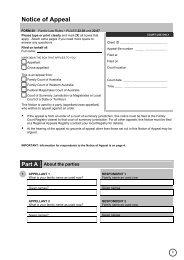
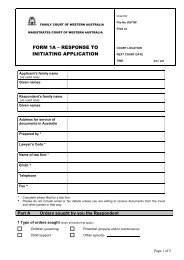
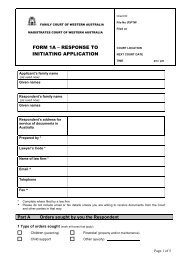

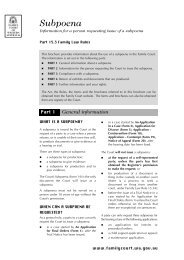
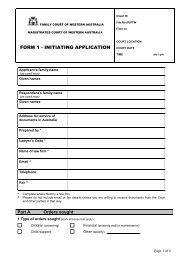
![Y and M [2007] - Family Court of Western Australia](https://img.yumpu.com/46403729/1/184x260/y-and-m-2007-family-court-of-western-australia.jpg?quality=85)

